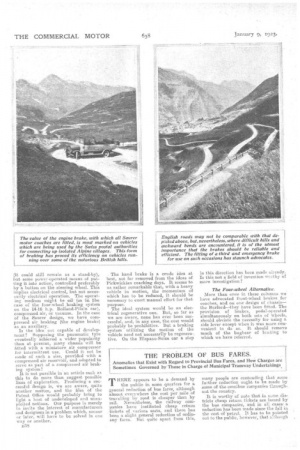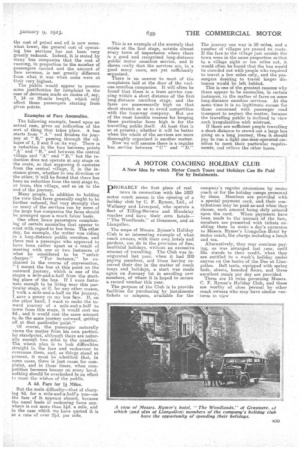THE PROBLEM OF BUS FARES.
Page 24

Page 25

If you've noticed an error in this article please click here to report it so we can fix it.
Anomalies that Exist with Regard to Provincial Bus Fares, and How Charges are Sometimes Governed by Those in Charge of Municipal Tramway Undertakings.
THERE appears to be a demand by the public in some quarters for a general reduction of bus fares, although almost everywhere the cost per mile of travelling by road is cheaper than by rail. Nevertheless, the railway companies have instituted cheap return tickets of various sorts, and there has been a slight general reduction of ordinany fares. But quite apart from this,
many people are contending that some further reduction ought to he made by some of the omnibus companies through-. out the country.
It is worthy of note that in some districts cheap return tickets are issued by the bus companies, and in all cases; a reduction has been made since the fall in the cost of ,petrol.. It has to be painted out to the public, however, that although
the cost of petrol and oil is now somewhat lower, the general cost of operating bus services has not been very greatly reduced. Indeed, it is stated by many bus companies that the cost of running, in proportion to the number of passengers carried and the amount of fare revenue, is not greatly different from what, it was • when costs were at their very highest.
The public would appear to possess some justification for complaint in the ease of decreases made on routes of, say, 7, 14 or 20-mile length, which only affect those passengers starting from given points.
Examples of Fare Anomalies.
The following example, based upon an actual ease, gives an indication of the sort of thing that takes place. A bus starts from "A" and finishes its journey at " B," passing through the villages of 1, 2 and 3 on its way. There is a reduction in the fare between points "A" and "B," and between the central village and "A" and "B," but the reduction does not operate at any stage on the route, so that supposing it operates from the central village, 2, in the instance given, whether in one direction or the other; it will be found that there has been no reduction from the next stage to, or from, this village, and so on to the end of the journey.
Manypeople, in addition to holding the view that fares generally ought to be further reduced, feel very strongly that On many of the services run by some of the large bus companies the fares should be arranged upon a much fairer basis.
One often hears passengers complaining of certain anomalies that appear to exist with regard to bus fares. The othee day, for example, the writer was riding in a long-distance public omnibus, and there met a passenger who appeared to have been rather upset as a result of meeting with one or two instances of what he considered to be "unfair charges." "'For instance," he explained in the course. of conversation, "I mount the bus at this point on the outward journey, which is one of the stages a mile-and-a-half from the starting place of the bus. If I were fortu: nate enough to be living near this particular stage, or if for any other reason, I walk a mile-and-a-half on the journey, I save a penny on my bus fare. If, on the other hand, I want to make the inward journey of a mile-and-a-half to town from this stage, it would cost me 4c1., and it would cost the same amount to do the same journey outward, getting off at that particular point." • Of course, the passenger naturally views the matter from his own particular standpoint, although there are naturally enough two. sides to the question. The wisest plan is to look difficulties straight in the face and endeavour to overcome them, and, as things stand at present, it must be admitted that, in some cases, there is just cause for complaint, and in these times, when competition becomes keener on every hand, nothing should be overlooked in an effort to meet the wishes of the public.
A 4d. Fare for 1. Miles.
But the main difficulty—that of charging 4d. for a mile-and-a-half's run—on the face of it appears absurd, because the usual basis of reckoning fares anywhere is not more than 1.1d. a mile' and in the case which we have quoted it is at a rate of over 20. per mile.
This is an example of the anomaly that exists at the first stage, outside almost every town of importance where there is a good and recognized long-distance public motor omnibus service, and Et shows ieally that the services are, in a good many cases, not yet sufficiently erg,anized.
There is an answer to most of the complaints laid at the door of the various omnibus companies. It will often be found that there is a tram service running within a short distance of the first, long-distance omnibus stage, and the fares are unnecessarily high on that short stretch so as to avoid competition With the tramway company. But one of the most forcible reasons for keeping these particular fares high is for the travelling public itself. At least that is so at present; whether it will he better when the whole of the services are more thoroughly organized is another matter.
Now we will assume there is a regular bus service between "C" and "D." The journey one way is 20 miles, and a number of villages are passed en route. If the fare to the village just outside the town were in the same proportion as that to a village eight or ten miles out, it would often be found that the bus would be crowded out with people who required to travel a few miles only, and the passengers desiring to travel longer distances would be left behind.
This is one of the greatest reasons why there appear to be anomalies, in certain instances-, in the matter of fares on some long-distance omnibus services. At the same-time it is no legitimate excuse -for those concerned with passenger road transport to neglect the matter, because the travelling public is inclined. to view such irregularities with mistrust.
If there are sufficient people travelling a short distance to crowd out a large bus going on a long journey, then it should pay to run a light one-man-operatedomnibus to meet their particular requirements, and relieve the other buses.
































